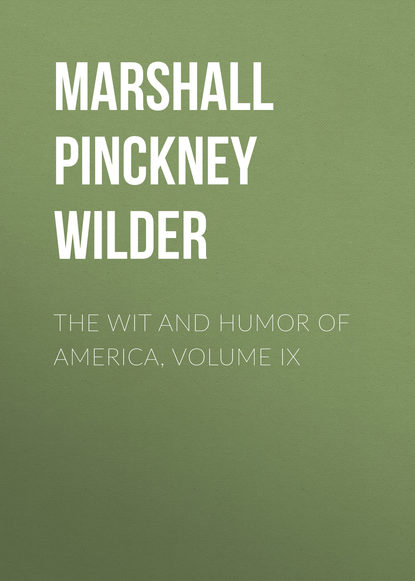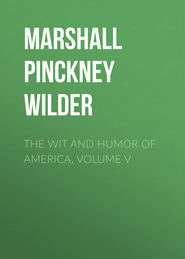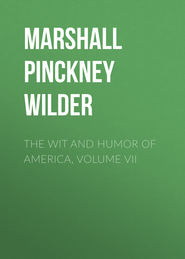По всем вопросам обращайтесь на: info@litportal.ru
(©) 2003-2024.
✖
The Wit and Humor of America, Volume IX
Автор
Год написания книги
2019
Настройки чтения
Размер шрифта
Высота строк
Поля
I never bet—ner never wrought
Upon my feller-man to bet—
And yit, at times, I've often thought
Of my convictions with regret.
I bless the hoss from hoof to head—
From head to hoof, and tale to mane!—
I bless the hoss, as I have said,
From head to hoof, and back again!
I love my God the first of all,
Then Him that perished on the cross,
And next, my wife,—and then I fall
Down on my knees and love the hoss.
WHEN DOCTORS DISAGREE
BY S. E. KISER
He looked at my tongue and he shook his head—
This was Doctor Smart—
He thumped on my chest, and then he said:
"Ah, there it is! Your heart!
You mustn't run—you mustn't hurry!
You mustn't work—you mustn't worry!
Just sit down and take it cool;
You may live for years, I can not say;
But, in the meantime, make it a rule
To take this medicine twice a day!"
He looked at my tongue, and he shook his head—
This was Doctor Wise—
"Your liver's a total wreck," he said,
"You must take more exercise!
You mustn't eat sweets.
You mustn't eat meats,
You must walk and leap, you must also run;
You mustn't sit down in the dull old way;
Get out with the boys and have some fun—
And take three doses of this a day!"
He looked at my tongue, and he shook his head—
This was Doctor Bright—
"I'm afraid your lungs are gone," he said,
"And your kidney isn't right.
A change of scene is what you need,
Your case is desperate, indeed,
And bread is a thing you mustn't eat—
Too much starch—but, by the way,
You must henceforth live on only meat—
And take six doses of this a day!"
Perhaps they were right, and perhaps they knew,
It isn't for me to say;
Mayhap I erred when I madly threw
Their bitter stuff away;
But I'm living yet and I'm on my feet,
And grass isn't all I dare to eat,
And I walk and I run and I worry, too,
But, to save my life, I can not see
What some of the able doctors would do
If there were no fools like you and me.
THE BOAT THAT AIN'T[4 - From "Nautical Lays of a Landsman," by Wallace Irwin. Copyright, 1904, by Dodd, Mead & Co.]
BY WALLACE IRWIN
A stout, fat boat for gailin'
And a long, slim boat for squall;
But there isn't no fun in sailin'
When you haven't no boat at all.
For what is the use o' calkin'
A tub with a mustard pot—
And what is the use o' talkin'
Of a boat that you haven't got?
HOW JIMABOY FOUND HIMSELF
BY FRANCIS LYNDE
When Jimaboy began to live by his wits—otherwise, when he set up author and proposed to write for bread and meat—it was a time when the public appetite demanded names and naïveté. And since Jimaboy was fresh enough to satisfy both of these requirements, the editors looked with favor upon him, and his income, for a little while, exceeded the modest figure of the railroad clerkship upon which he had ventured to ask Isobel to marry him.
But afterward there came a time of dearth; a period in which the new name was no longer a thing to conjure with, and artlessness was a drug on the market. Cleverness was the name of the new requirement, and Jimaboy's gift was glaringly sentimental. When you open your magazine at "The Contusions of Peggy, by James Augustus Jimaboy," you are justly indignant when you find melodrama and predetermined pathos instead of the clever clowneries which the sheer absurdity of the author's signature predicts.
"Item," said Jimaboy, jotting it down in his notebook while Isobel hung over the back of his chair: "It's a perilous thing to make people cry when they are out for amusement. Did the postman remember us this morning?"
Isobel nodded mournfully.
"And the crop?" said Jimaboy.
"Three manuscripts; two from New York and one from Boston."
"'So flee the works of men
Back to the earth again,'"
quoted the sentimentalist, smiling from the teeth outward. "Is that all?"
"All you would care about. There were some fussy old bills."
Upon my feller-man to bet—
And yit, at times, I've often thought
Of my convictions with regret.
I bless the hoss from hoof to head—
From head to hoof, and tale to mane!—
I bless the hoss, as I have said,
From head to hoof, and back again!
I love my God the first of all,
Then Him that perished on the cross,
And next, my wife,—and then I fall
Down on my knees and love the hoss.
WHEN DOCTORS DISAGREE
BY S. E. KISER
He looked at my tongue and he shook his head—
This was Doctor Smart—
He thumped on my chest, and then he said:
"Ah, there it is! Your heart!
You mustn't run—you mustn't hurry!
You mustn't work—you mustn't worry!
Just sit down and take it cool;
You may live for years, I can not say;
But, in the meantime, make it a rule
To take this medicine twice a day!"
He looked at my tongue, and he shook his head—
This was Doctor Wise—
"Your liver's a total wreck," he said,
"You must take more exercise!
You mustn't eat sweets.
You mustn't eat meats,
You must walk and leap, you must also run;
You mustn't sit down in the dull old way;
Get out with the boys and have some fun—
And take three doses of this a day!"
He looked at my tongue, and he shook his head—
This was Doctor Bright—
"I'm afraid your lungs are gone," he said,
"And your kidney isn't right.
A change of scene is what you need,
Your case is desperate, indeed,
And bread is a thing you mustn't eat—
Too much starch—but, by the way,
You must henceforth live on only meat—
And take six doses of this a day!"
Perhaps they were right, and perhaps they knew,
It isn't for me to say;
Mayhap I erred when I madly threw
Their bitter stuff away;
But I'm living yet and I'm on my feet,
And grass isn't all I dare to eat,
And I walk and I run and I worry, too,
But, to save my life, I can not see
What some of the able doctors would do
If there were no fools like you and me.
THE BOAT THAT AIN'T[4 - From "Nautical Lays of a Landsman," by Wallace Irwin. Copyright, 1904, by Dodd, Mead & Co.]
BY WALLACE IRWIN
A stout, fat boat for gailin'
And a long, slim boat for squall;
But there isn't no fun in sailin'
When you haven't no boat at all.
For what is the use o' calkin'
A tub with a mustard pot—
And what is the use o' talkin'
Of a boat that you haven't got?
HOW JIMABOY FOUND HIMSELF
BY FRANCIS LYNDE
When Jimaboy began to live by his wits—otherwise, when he set up author and proposed to write for bread and meat—it was a time when the public appetite demanded names and naïveté. And since Jimaboy was fresh enough to satisfy both of these requirements, the editors looked with favor upon him, and his income, for a little while, exceeded the modest figure of the railroad clerkship upon which he had ventured to ask Isobel to marry him.
But afterward there came a time of dearth; a period in which the new name was no longer a thing to conjure with, and artlessness was a drug on the market. Cleverness was the name of the new requirement, and Jimaboy's gift was glaringly sentimental. When you open your magazine at "The Contusions of Peggy, by James Augustus Jimaboy," you are justly indignant when you find melodrama and predetermined pathos instead of the clever clowneries which the sheer absurdity of the author's signature predicts.
"Item," said Jimaboy, jotting it down in his notebook while Isobel hung over the back of his chair: "It's a perilous thing to make people cry when they are out for amusement. Did the postman remember us this morning?"
Isobel nodded mournfully.
"And the crop?" said Jimaboy.
"Three manuscripts; two from New York and one from Boston."
"'So flee the works of men
Back to the earth again,'"
quoted the sentimentalist, smiling from the teeth outward. "Is that all?"
"All you would care about. There were some fussy old bills."








